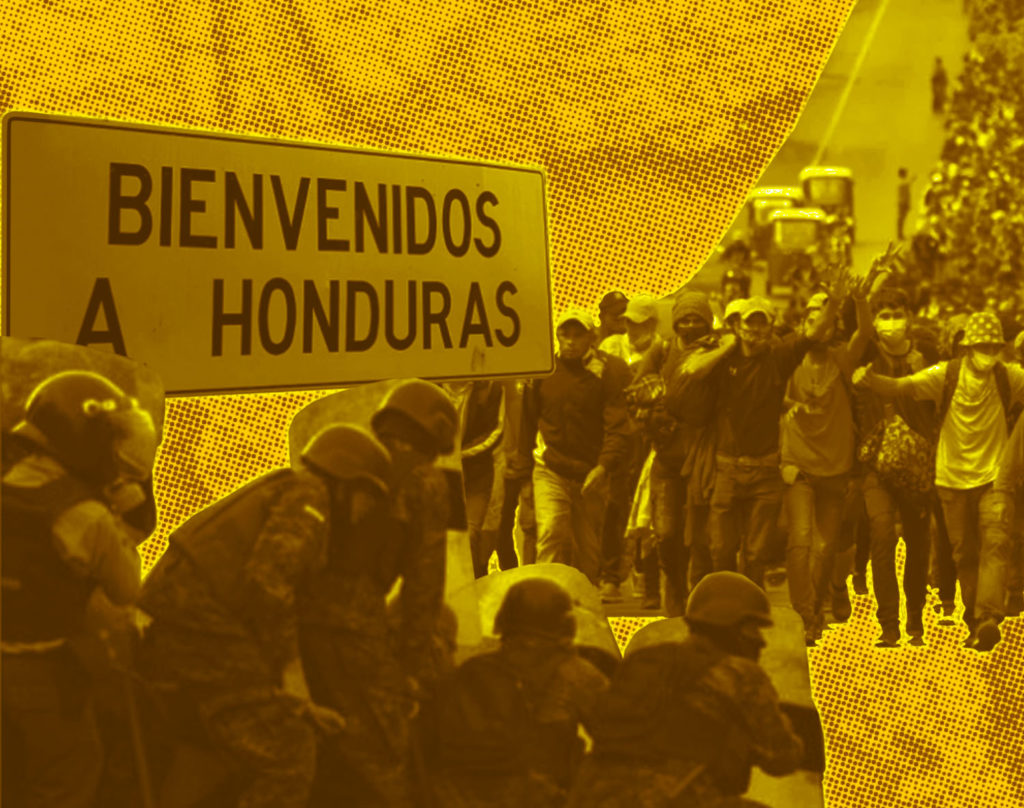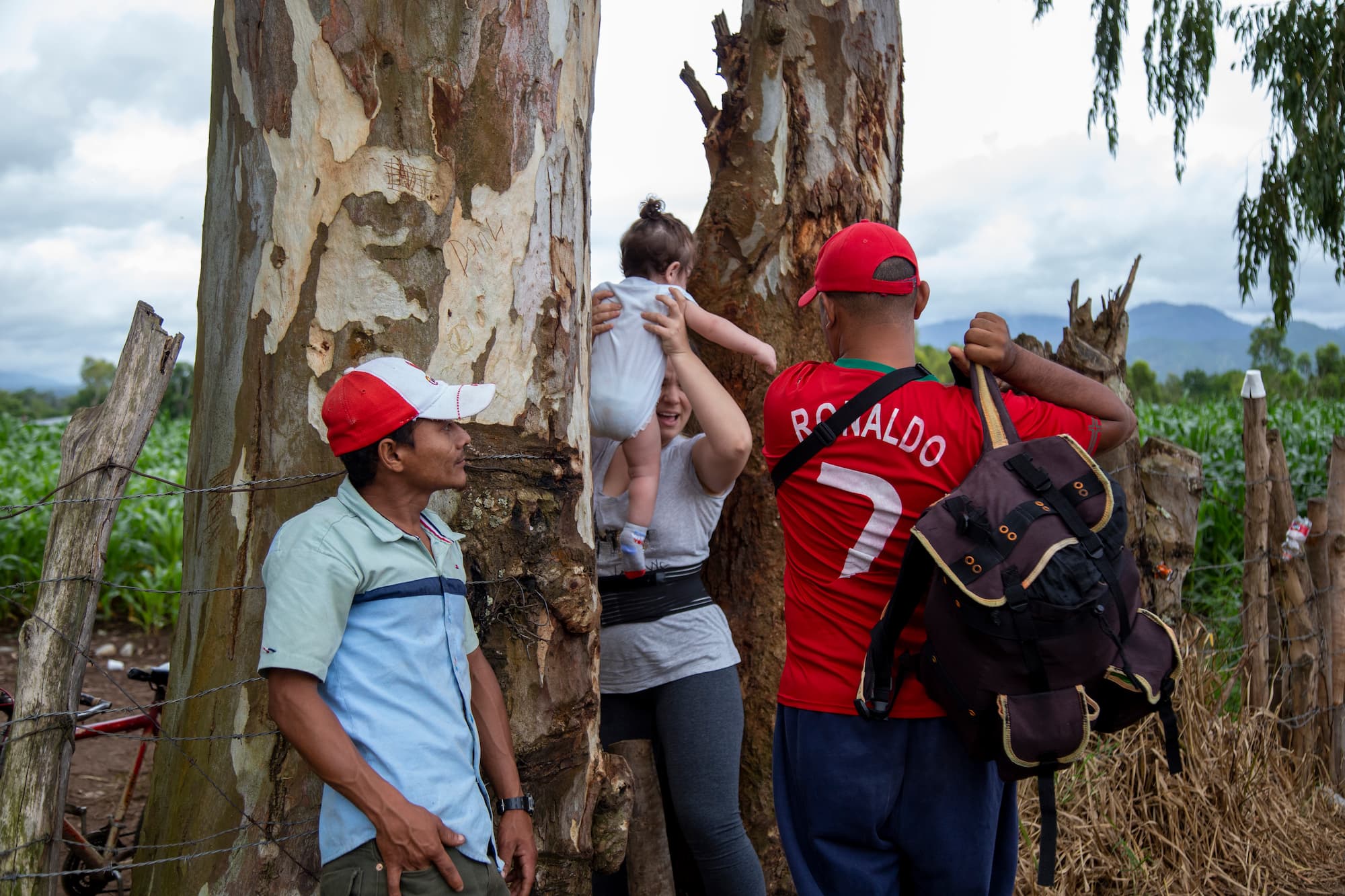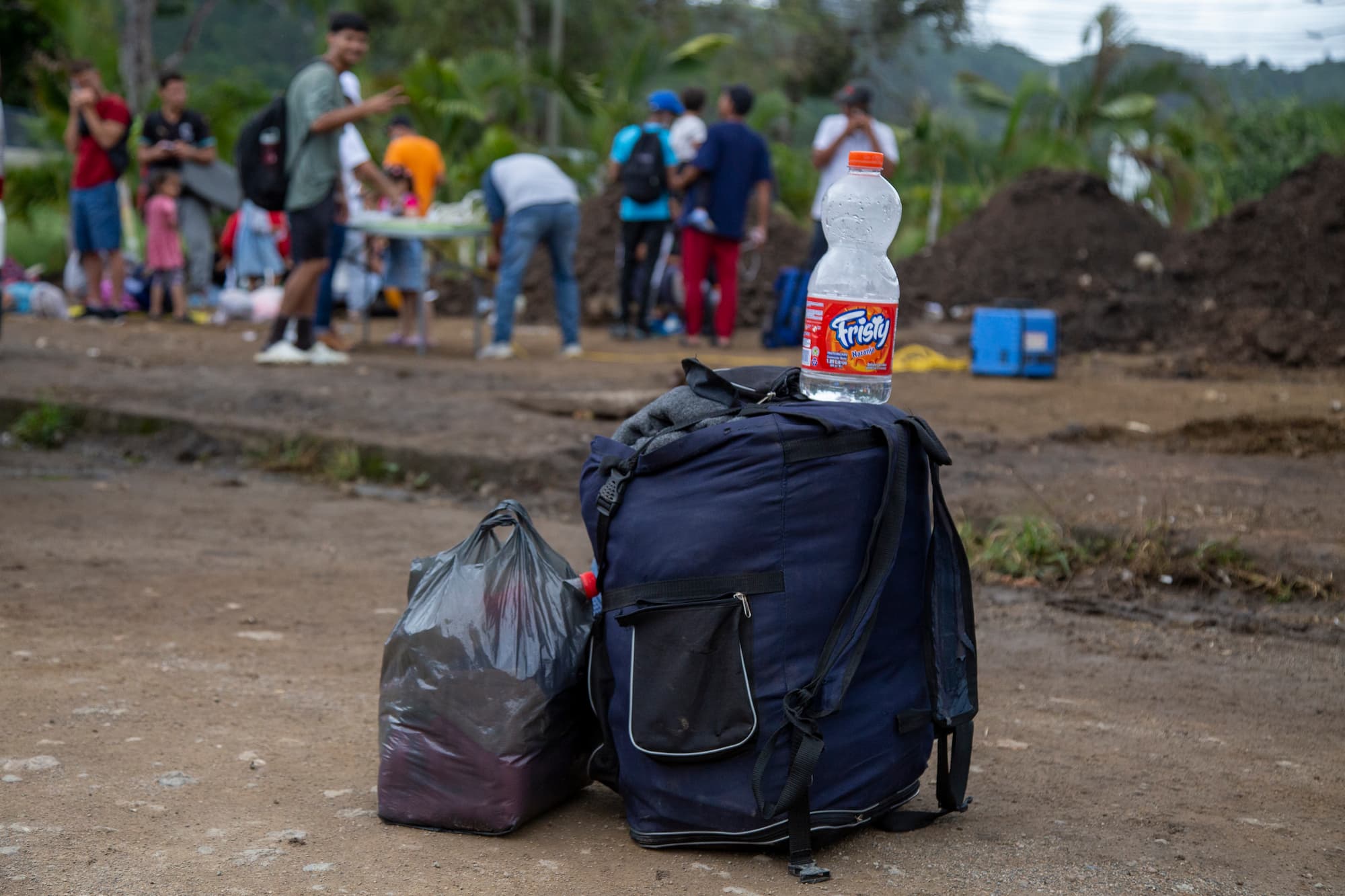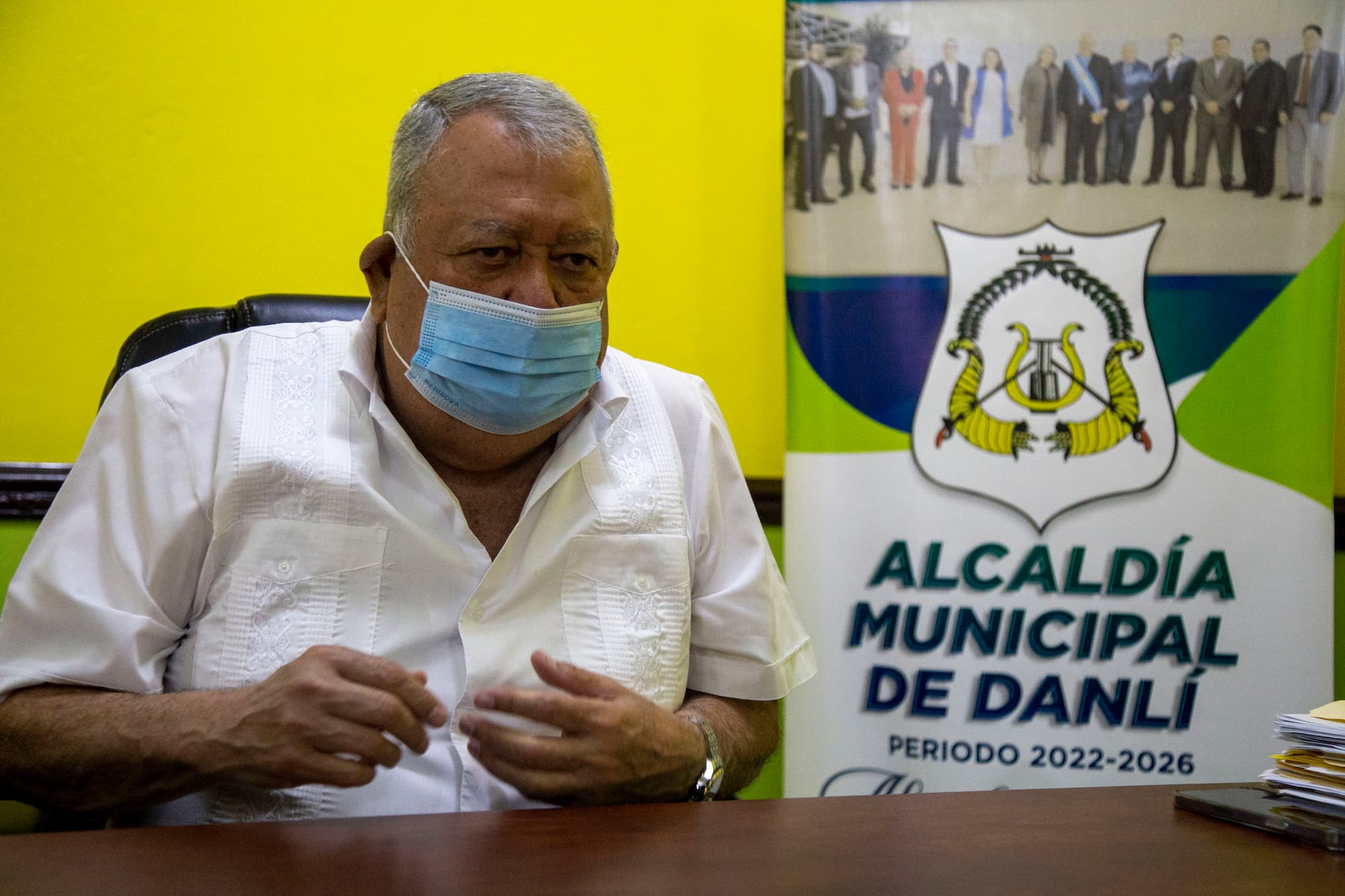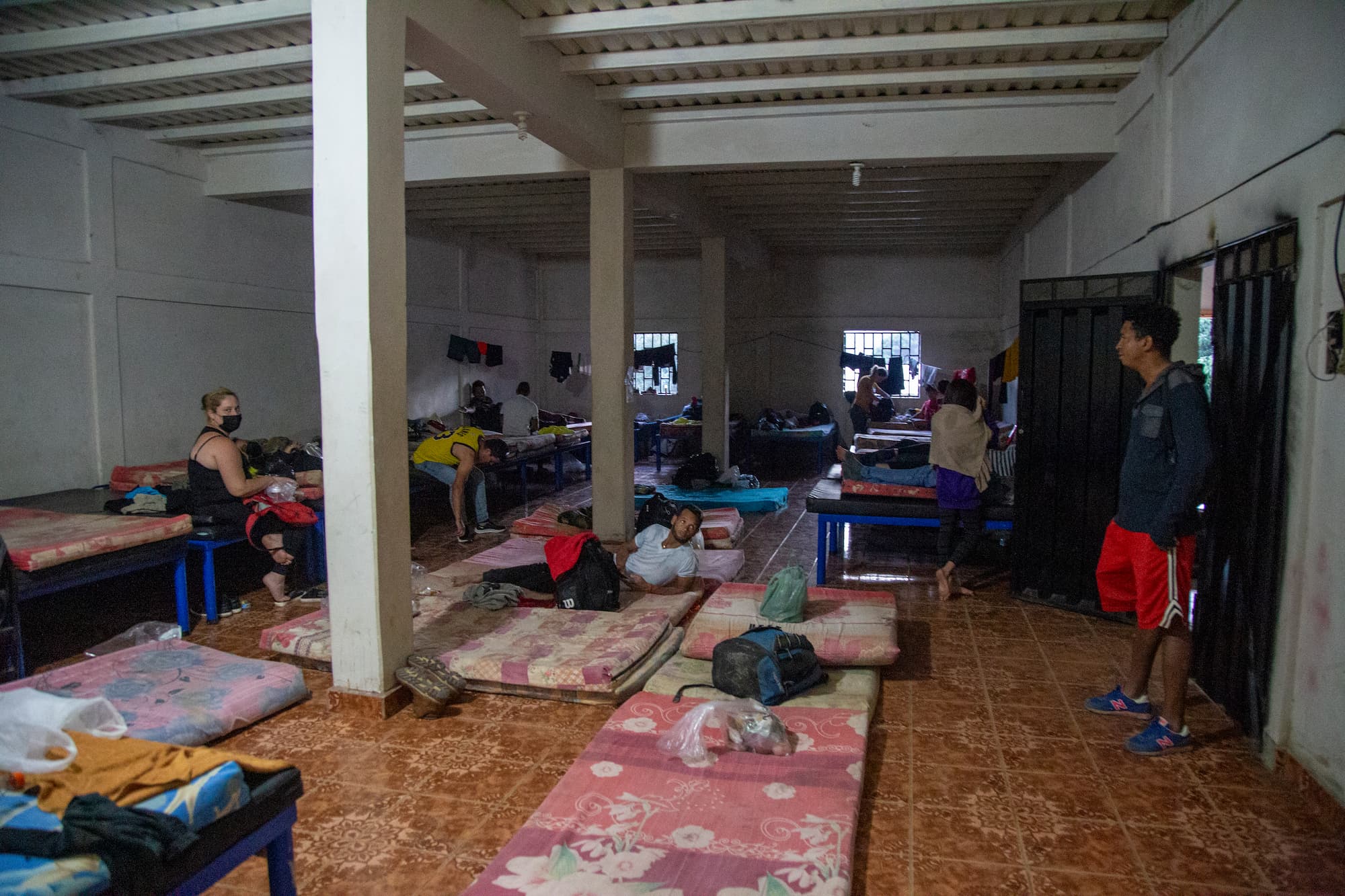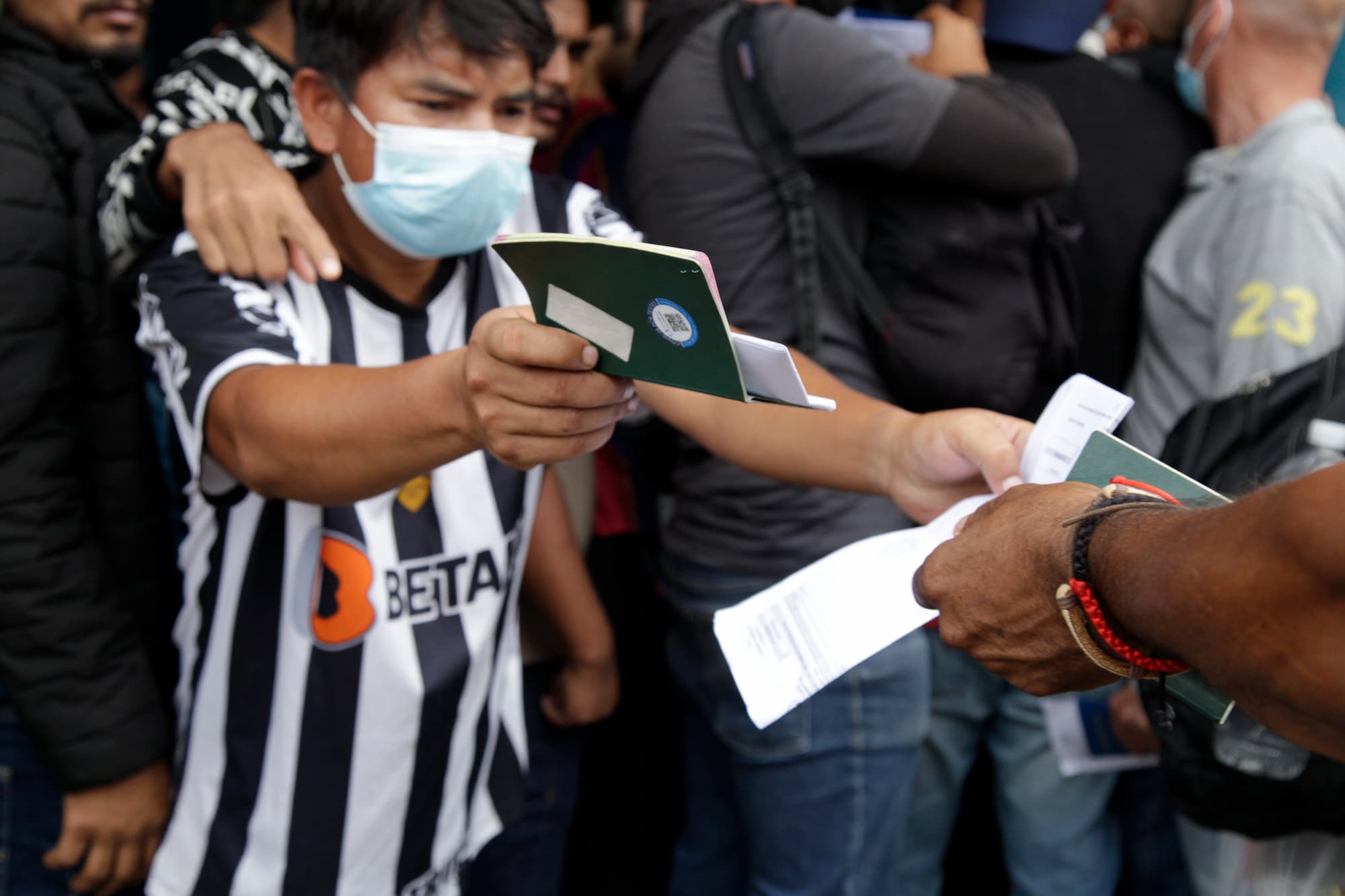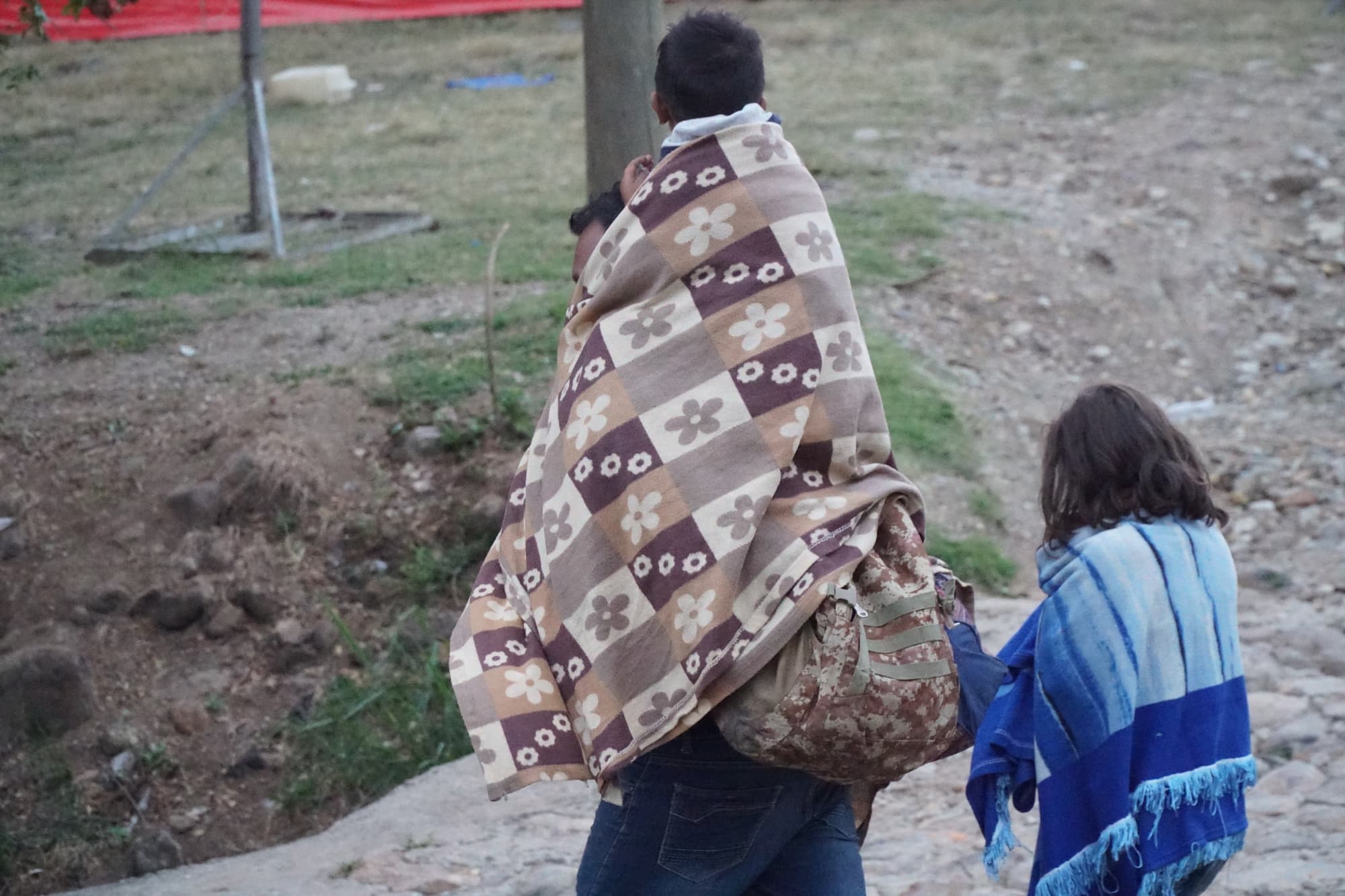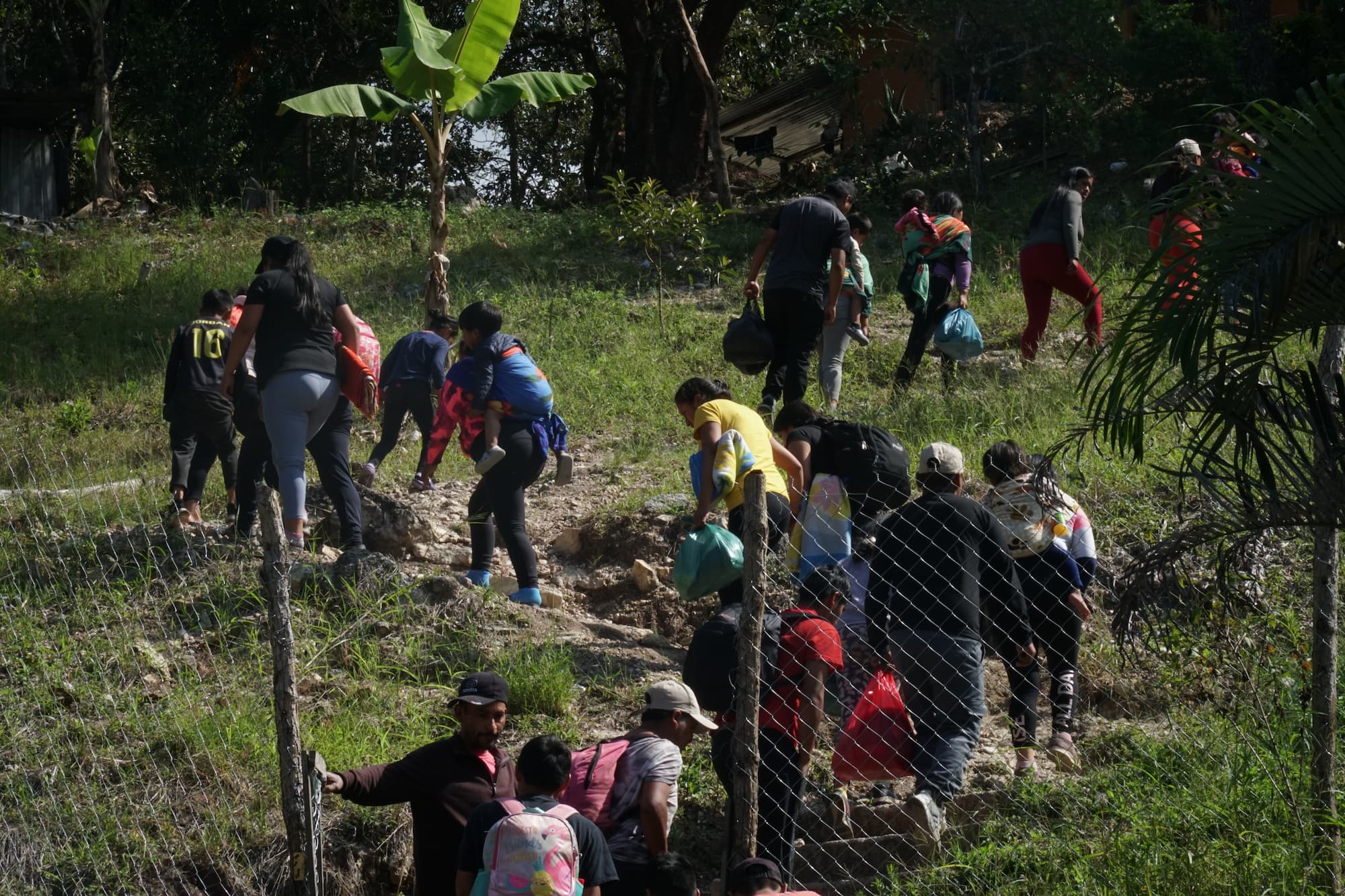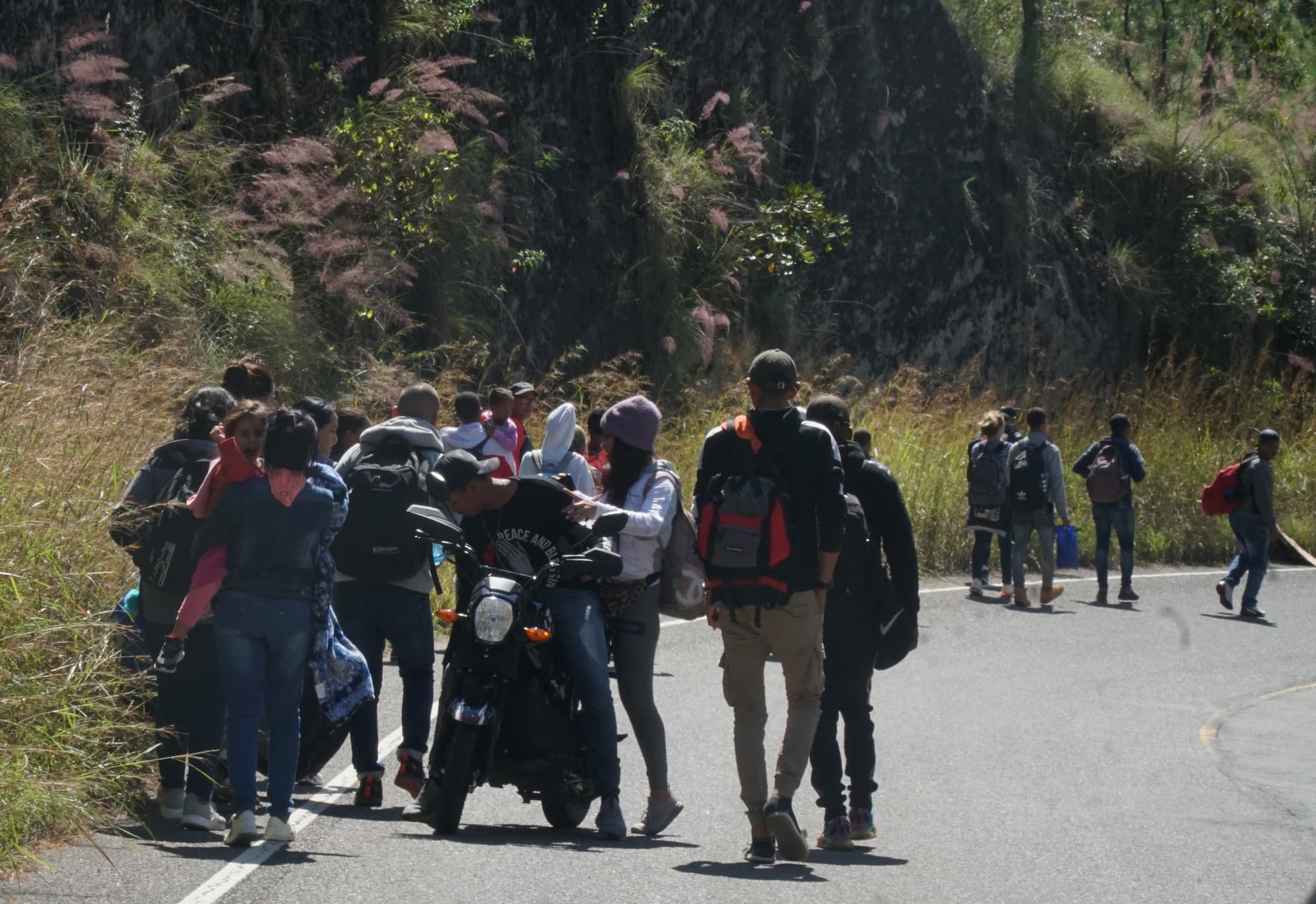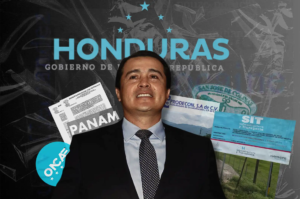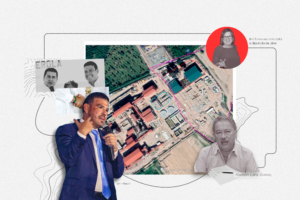In 2022, around 190,000 people entered Honduras irregularly, the majority of them from Cuba and Venezuela; more people than in the past 12 years. Honduras, a country in exodus, where more than 15,000 people emigrated in caravans, has now become a stopover to the north. At 4,000 kilometers from the U.S. border, in impoverished border towns, migrant inflation, police corruption, and trafficking networks sprout. The new exodus travels the old migration route.
This article is part of the Tirano Tours, a special journalistic series that documents the experiences of the recent migratory trends throughout the Central American region, from Redaccion Regional.
Texto: Allan Bu
Fotografía: Fernando Destephen y Amílcar Izaguirre
Translated by: Jorge Paz Reyes
The arrival
Sandro Araújo had a fractured hand and insect bites that covered almost his entire skin, but kept smiling. Lying on a small bed in a Catholic shelter in Danlí, a small Honduran town bordering Nicaragua, he seemed optimistic. Although he still had more than 4,000 kilometers to go, he had already overcome one the most difficult parts of the journey: crossing the Darien Gap, the jungle full of natural and criminal dangers that links Colombia and Panama. It was July 2022, and it had been two weeks since Sandro had started his journey to the United States from Colombia, where he had migrated to escape poverty in Venezuela.
«There are people who have stayed on the road, they can’t climb a slope and have a heart attack, but one has to migrate because the narco-communism we have in Venezuela is strong, nobody survives that. If you are a public employee they force you to go out to march. Would you put up with that? A salary of 30 dollars a month, who eats with that? Never! You have to migrate», said this former official of the Ministry of Education of the government of Nicolás Maduro.
Honduras has always been a place to escape from, but for Venezuelans, getting here is good news. The bed in which Sandre rested had been used by hundreds, perhaps thousands, of migrants before him. Since the end of 2020, the country in which 15 thousand people marched in caravans to the United States and just last year the remittance accounted for 25% of the GDP, now has become a pit stop, a waiting room for the journey up north. In 2022, according to records of the National Migration Institute, 188,852 people entered the country irregularly- more than in the past 12 years- the majority from Venezuela, Cuba, and Haiti.
Danlí is a trading center in the east of Honduras, in the state of El Paraíso, which is known for the growing of tobacco and livestock. Until two years ago it was just that, a quiet rural town. But as Sandro rested in the shelter, in the streets it was clear that the massive arrival of migrants had changed the landscape and economy of the place.
In the corners, it was common to see people with signs that said «My Honduran brother, I’m Venezuelan and I need help. God bless you». The migration offices were surrounded by a larger group of people who at that time had to either pay a 237 US dollars fine for entering the country illegally or wait three to five days to obtain a safe-conduct and continue their journey.
There was José Farías, who had been traveling for 20 days from Venezuela with two friends and three minors. The last salary he earned in his country was 10 US dollars monthly. «I couldn’t even buy pants», said as he got on the back of a pick-up truck. Then he began to cry. «I don’t have any resentment in my heart, because I have been doing this for almost a month, and ‘huevon’, you are between life and death, but for my kids, I would do it again», said as the tears rolled down his cheeks.
The arrival of migrants, in the beginning, sparked a sentiment of solidarity in the bordering towns of Honduras, such as Danlí y Trojes. The Roman Catholic Church installed three shelters to receive the immigrants and volunteers prepared up to 1,200 plates daily to feed them. In January of last year, the volunteers became tired, but the shelters continue to be open and in July, they still delivered raw food for migrants to cook on two gas stoves.
«The issue of the lack of volunteers has become an opportunity for some people to get out of poverty,» said Kenia Zeron, coordinator of the Migrant Welcome community.
When migrants cross the border of a country in which people have always fled and continue to do so, what you find is inflation, human trafficking, and corruption. Regardless, Sandro, lying with his hands behind his head describes this waiting room as a «blessing».
The mayor
The mayor of Danlí, Abraha Kafati, received us in his spacious office which contrasts with the modesty of the rest of the Municipality building. Kafati, 65, is a former congressman and local businessman that has invested in gas stations, communication, and hotels. He became mayor as a National Party candidate in November of 2021 and his municipality was the only one where the Former and extradited president Juan Orlando Hernandez swept the polls. The mayor took office in the middle of a migration wave.
The sources consulted denounce that the role of the State has been reduced to issuing safe-conducts and collecting fines for irregular entry. During the interview, the mayor made no effort to hide his annoyance at the thousands of migrants who have arrived in the city.
What has the Mayor’s Office done to help the migrants?
- We had tried to help, but we do not have the budget for it. The things that have been done are more on a personal level along with other mayors, with whom we have given food to help them out a little.
Are you not prepared as Municipal Office to help out?
- We are receiving an enormous number of migrants and what happens is that when these people come, now we need shelters, but not for our own population but for the people who are migrating from other countries.
- What is the problem we are facing? These people come and park here in Danlí and in Trojes and if you go to where the migration offices are, you will be afraid of the amount of people that are outside doing their needs in the street and looking for someone to feed them because there are no shelters and there is no way to feed them.
Will there be an increase in commercial activity with this massive passage of migrants?
- Do you think migrants come with money? They are walking around with signs asking for food; if they were coming with money then congratulations, but these people come looking for better ways to get to the United States; unfortunately, we have to support them here. Here we have made efforts to give them food, not all the time, but in some cases, because it comes out of our own pockets, not from the central government. We do not have the budget to do those things
The mayor ended the interview by complaining about how the central government is not doing anything to solve the migrant problem:
«We need 5 or 10 trucks so immediately as they arrive we go drop them off at the Guatemalan border, which is what they do in other countries. If we were to do that, things would be different, we would not have a town full of beggars. You can all see it, the large number of people asking, and they are not Danlidenses (from Danlí), they are migrants».
The inflation
On the border between Honduras and Nicaragua, Lempiras, Honduras’ currency, has practically disappeared from the local economy. On the store signs, products are advertised at $5, $10, $15, $20 o $100 US dollars. Inflation for migrants, especially for Cubans and Asians, who have more resources than Venezuelans and Haitians, has evolved into a particular currency exchange. Officially, one dollar is equivalent to almost 25 lempiras, but in towns like Danlí or Trojes, the exchange rate is 1 to 1.
A beverage for a migrant can cost up to 5 US dollars. Cab fares in Danlí go between 80 to 100 lempiras (4 USD), but there are drivers who ignore regular clientele and wait outside migration offices to offer migrants a ride to the bus terminal. Each traveler is charged 5 USD, and on each trip, they do not take less than four passengers. Their profits have quintupled. Hotels prefer their guests to be migrants. When we were in Danlí, a town with no tourist attractions, the hotel occupancy was almost 100%.
The sacristan of the Catholic Church in Danlí, Rigoberto Rivera, recalled in August that on one occasion he had to argue with a vendor who was offering a bag of rosquillas (dry bread made from corn flour) for $25, which usually costs 25 lempiras: «I told the migrant – you are not going to pay $25 for that – and I gave him the 20 lempiras. Here they offer them a sandwich for 20 dollars [it costs 25 or 35 lempiras, equal to one dollar]; a bag of water for two dollars… This has been a round business, here there are people [dedicated to transportation] who changed their entire fleet of vehicles».
In order to stop the price of gouging, a group of university students started the campaign «Hermano migrante, ¡no te dejes engañar!» (Migrant brother, don’t be fooled!), placing posters in some parts of town with the real prices of various basic products in lempiras.
«The reality is that the arrival of this bunch of migrants has dollarized the economy of the municipality, there are signs everywhere that say ‘dollars are exchanged’. That means that they come with money and exchange it», said Fredy Morazán, one of the two employees in the migration post in Trojes, a small border village two and half hours from Danlí.
From the moment migrants cross into Honduras from the blind spots at the border, which are some sort of doors made up of Eucalipto trees, to the moment they cross to Guatemala to continue their journey, they pay surcharged prices. A motorcycle taxi takes them to Trojes for around 3 to 6 dollars (150 Lempiras), for a Honduran this service goes between 15 to 30 Lempiras. Those who can’t pay, walk three kilometers from the border to the town. At the border of Agua Caliente, between Honduras and Guatemala, the prices of coffee, water, or a cab are doubled or even tripled for them.
«It’s good for business, but bad for the migrants because a lot of people take advantage of the situation and scam them», said Corina Diaz, who used to be in charge of one of the shelters in Trojes.
«This business practice started with the Cubans, who arrive paying for everything, if you charge them 10 USD for a water bottle that’s what they’ll pay, so they [businessess] stayed with the perception that the migrant carries dollars no matter if they they are Haitian or Venezuelan», said Kenia Zerón.
The police
On an August afternoon in 2022, dozens of motorcycles surrounded the migration offices in Trojes waiting for clients. The business of hyperinflation for migrants is accompanied by that of human trafficking, the classic «coyote». Motorcyclists offered their services to migrants who did not wish to wait for a safe-conduct, which is an official government permit that allows them to move through the country without inconvenience. An internal human smuggling network has been established in the small border town, which from a village called Santa María takes them to Danlí through the mountains on motorcycles and four-wheel drive cars to avoid a couple of National Police checkpoints. They are then taken to the Agua Caliente border. Those who use these services pay up to $30 and may leave Honduras the same day they arrive.
Those waiting for safe passage are also not free from trafficking networks and police corruption. According to the testimony of at least 10 migrants, they are transported in a bus from Danlí for six dollars to the outskirts of Tegucigalpa. There, every night between 15 and 20 buses wait to make the $30 trip to Ocotepeque, some 30 kilometers from the border.
«They are cheating us from all sides and the main one is the Police, who are charging their share. It’s shameless. They tell you, get on the bus, if you go to the capital you might get mugged, you’d better stay there on that bus,» said Martin in December last year. He is a Colombian who lived in Venezuela until his cattle could no longer support him
«They are cheating us from all sides and the main one is the Police, who are charging their share. It’s shameless. They tell you, get on the bus, if you go to the capital you might get mugged, you’d better stay there on that bus,» said Martin in December last year. He is a Colombian who lived in Venezuela until his cattle could no longer support him.
At the Agua Caliente border, there are two gates, one for vehicles leaving and the other for vehicles entering Honduras or Guatemala, it all depends on which side we are on. There are always long lines of cargo waiting for hours to go through the cumbersome customs procedures. Just meters from the gates, there are small grocery stores and fried chicken restaurants. About 300 meters from the borderline marking those gates, there are roads or blind spots that migrants use to cross without documents into Guatemala. Martín wanted to get to this border, where he wanted to be dropped off, but the bus left him stranded about 40 minutes from the border. He had to pay five dollars more.
«We have detected that the main violations are: transportation [overpriced prices], extortion charges being committed by the police, and those [excessive] charges for the purchase of basic necessities. Even borrowing a toilet costs two dollars,» said Cecilia Reyes, head of the Municipal Women’s Office in Ocotepeque. «One day we asked the commissioner in charge (in Ocotepeque) that we urgently needed a patrol car for the transfer of a woman and he told me «ask the mayor to gift you a car, they manage millions there«, but in the early morning, there are a lot of patrol cars behind the migrants’ money. The police are part of the corruption, I have told them, for them, it is very important to know how many buses arrived and for the military, it is the same», he denounced.
At the end of 2022, a video circulated showing a police officer receiving bills on a bus that allegedly transported migrants to Ocotepeque. At the border, an officer said that he had never seen a migratory flow of these proportions, «There will be no one left in Venezuela,» he said. We asked him if the migrants bring money and his answer knocked directly on the door of the institution he works for. «When they come here how many operations have not happened in which they have stripped those poor people?».
«To us, they don’t say anything, they just care about charging us and that’s it because when they stop us they don’t even ask for the safe conduct. In all of the checkpoints, it’s the same thing. It’s a shame, but once you get onto the bus the police don’t bother you, what they want is for you to pay them», explained a Dominican migrant.
Coyotes in the waiting room
«We are close. How do we go back to Venezuela? At this point is easier to get to the U.S than to go back», said Obelier on July 2022. He and his friends walked for 77 kilometers between Trojes and Danlí. While they waited five days for safe conduct that would allow them to pass through Honduras legally, they worked unloading trucks and selling candy at a terminal.
«The way up is really hard,» said Ariel Herrera in December of last year in a corner of Nueva Ocotepeque. Some compatriots had told him what awaited him further north: that in Mexico the police would tear up permits issued by immigration in order to exhort or deport them. «You have to make copies and carry them hidden», explained.
«I’m going to have my child there [the United States]», Julissa said, between excitement and indignation, because the promised transport to the Guatemalan border had left her some 30 minutes from her destination. At the time she was seven months pregnant and had lost her husband on the way two months earlier. «If they catch me, I’ll grab a rope and tie myself up anywhere. They’re not going to deport me from there [the United States].»
Sandro, the man resting in the Danlí shelter, and José, the man who cried leaning against a car at the immigration offices, made it to the United States. But many do not. They get stranded on Mexico’s southern border, they are deported. Many are left in limbo in Guatemala City, without resources to continue their journey north or return south. While the United States continues to tighten its immigration policies, in Honduras…
Nueva Ocotepeque, a town located 40 minutes from the border, is known as the «Capital of Hospitality». Most of its inhabitants are friendly and welcome visitors with smiles and good humor. This was once the border town of Agua Caliente, but now there is a sense of hostility and business. Few people are friendly anymore and nobody talks about the passage of migrants, even less if you carry a camera and are a journalist. Four people from different organizations «suggested» that we leave the border because the coyotes could feel their business threatened.
In the old house of a friend, whose wide walls seem to block the noise, and protected by a dark night, we were received by «The Professor» who told us that he started eight months ago by chance to be a coyote. One day, he said he was going to Guatemala and gave him a «pull» to a Venezuelan family. They stayed in contact and days later these Venezuelans asked him to support some relatives. The recommendations of his services spread and the business was born.
His testimony coincides with the stories of the police and the charges they make during the entire transfer of migrants. «The Police and the Army are corrupt, they are institutions at the service of the people, but here is the operation between Sinuapa and the border, and when the cab goes, one of the agents approaches to ask for the papers and it is to take money from them.»
In Guatemala it is the same, «El Profesor» told us, the officers detect the buses that are crossing migrants and count how many are traveling; when returning, no one passes them without paying to circulate, «these people make thousands, but thousands, daily and calmly because you take them by hand,» he said.
The passage of migrants is such a big business that the borders have become a land of hostilities and new wealth. The informant said that even the owners of the land where the migrants cross receive their cut of the lucrative business, «the owners of the land are seated there and armed. The «guides» tell them how many they are taking and when they return they have to pay.»

